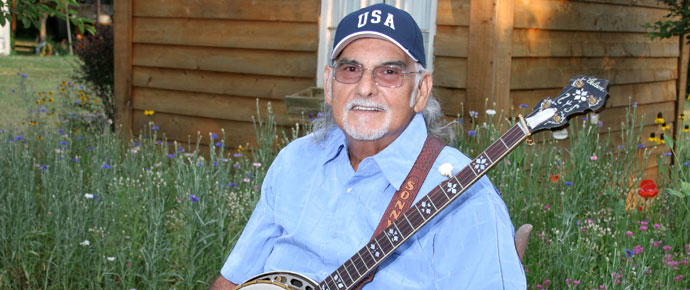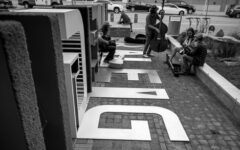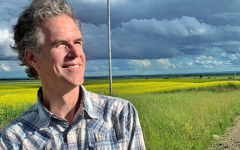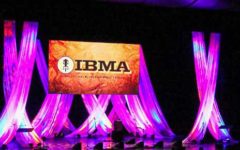
Ask Sonny Anything is a recurring feature where our readers pose questions to the great Sonny Osborne, one half of the iconic Osborne Brothers who redefined bluegrass music in the 1960s, and noted banjo maven and collector of fine prewar instruments. Everyone is encouraged to pose queries of your own each week in the comments, about his history in the music, his wealth of banjo knowledge, or regarding any life advice you might be needing.
Hey Sonny,
You’ve mentioned a few times that you carried. The moment backstage with Richard Nixon is one for the history (and law) books. I’m curious, in all your travels, did you ever have an accidental misfiring?
– Just curious
Just Curious. Thank you for your interest. I carried a weapon from 1975 to present. We played in St. Paul, Minnesota. While on stage we were robbed. Our limo was broken into and $4340.00 was missing. I decided to go armed after that. I don’t want to hurt anyone, and I’ll run from trouble, but I am not going to allow some low life SOB to take what I worked to earn. It’s too costly on health to get.
Accidental firing, no. I didn’t but Gene Wooten did, in our bus. David Crow is one Lucky man. I’m thankful to God that it turned out as it did. Whoever loaded that round did not crimp the shell and when Gene loaded the pistol the actual bullet fell out. When that round was fired, nothing came out the barrel. It was loud though, gunpowder loud, but no bullet.
Like a true dumbass, he was messing with a loaded gun and it fired. I heard it and ran to the front. Gene was standing there trembling, and most of all, David was standing there too. No one was hurt. We only had three rules. No drinking. No smoking. Don’t be late. After that we added one. Gene Wooten did not bring firearms on our bus ever again. As far as I knew, from that point no one carried a weapon, but me. I always had one in my pocket.
s
—–
Hi Sonny,
Thanks SO VERY MUCH for you, just always being you, and sharing with us every week!
My question is about a performance you did at the IBMA awards show back in Louisville literally just days after the horrendous 911 attack. When you walked out alone on that stage in the spotlight and began to play America the Beautiful we could see you trembling, even from way back where our seats were. Made me cry like a baby, and stands to this day as one of the most emotional musical moments of my long bluegrass life. Could you please tell us what was going through your mind as you played that tune for us all?
Karen Artis from Pennsylvania
Karen Artis. I know a Bob Artis. Related? I’m so glad you have given us a bit of your time. I want you to know that I shared this note with Bill Evans, whom I consider to be one of my very best friends. Bill Evans is the person who made that moment in time happen, and a moment in time it was, for a whole bunch of us Hillbillies!
We, as a people were mad, hurt, sad, proud, and ready to defend our country and way of life any way we could. My son was there, only a few blocks from building 2. He had to run, to find his car, and get out as quickly as possible. So, what was I feeling a few days after it happened… every emotion one could imagine.
Back to your question. What I felt… I was pretty good, confident, when I walked out to the mic – but then it all changed. When they turned the spotlights on…from that point on, I was totally lost. As though blind.
See, on top of the banjo neck are small black dots, known as position markers to tell you exactly where you are. I didn’t think I needed them so they were hardly ever used but when those spotlights came on, I really needed them right then, but they weren’t there. The glare from those spots completely blocked the neck. I thought at the time it was going to be a train wreck. Those lights, three or four spotlights, were so bright, I couldn’t see the first row, much less the neck of my banjo.
I thought, before I started playing, that if there is a guiding hand out there, right now would be a great time to make yourself known. I started playing and it was going good…Then the ending came into my mind. Single string notes there to the end. Miss one and you’re done. Well, here it is, somewhere near this spot. I hit the first string and it was the right note. I looked at my hands and they were actually shaking.
I don’t buy into stage fright, you can do it or you can’t… but right then my mind took me back to Bill Monroe, Grand Ole Opry, Rawhide, 14 years old, shaking like a leaf in strong wind. I needed help then and it appeared. I need it NOW. So, from the words above, “What I felt,” to now probably took 20 seconds. I needed the guiding hand and it came for the second time, 49 years and a few days later. Thank you Lord, I don’t think I missed a note of America The Beautiful.
I’ve never heard it played back. That is if IBMA cared enough to record it…which I strongly doubt. Why…. A NOTHING MOMENT LIKE THAT, WHO WOULD CARE? I would, for one. But, That’s the politics baby, I reckon! s
—–
Hey Sonny,
Hope all is well on your end.
When did you guys decide to electrify you instruments? Did you accept the idea right away, or did you have to grow into it? Love that clip of you all playing Ruby at the Camp Springs festival in 1971. It was awesome!
David R.
David R…thank you for your time. We had been playing country package shows and were not doing well by the lack of crowd response, but so far did not have an answer. We were booked in Minneapolis, MN at the Flame club for a week. The Flame was a prestigious venue that most Grand Ole Opry people played and visited regularly. It was our first time. We did the first night and the crowd sat out there and talked to one another while we were on. I told Bobby and Dale that we had to do something so they went to a music store and bought pickups for their mandolin and guitar.
Ronnie Reno was playing electric bass and I had an instrument with me that Sho-Bud had put some high dollar pickups in, so we borrowed the house band’s amps and we were in business.
I was determined that they were not going to talk while we were on. They might not like us but they were going to hear us. Man, we blew paint off the walls. After that we knew the answer to the package show problem too. We finished in Minneapolis that Saturday and played Greenville, SC the next Friday. It worked like magic. Like Moses Malone going after a rebound. When we did our final Rocky Top it sounded like a jet going over. Problem solved. We just played normal, did our usual stuff.
Those package shows drew 12,000-18,000 people so we were in business. Camp Springs in ’71 with Earl was something we’ll never forget. Our OB performance that day was good too. Brother Bobby was bringing it every time he stepped on stage. Ronnie Reno, Dennis Digby, Robby Osborne, and Dale Sledd. Man! Get away’m hyer!!!! s
—–
Hi Sonny, we’ve had many conversations about sports. Tell us about your love of sports and did you play any sports? Yes, I still have the Titans tickets!
Miss you and look forward to lunch soon!
Larry S
Lawrence my Bluegrass Brother who hauls me around on his bus… Larry Stephenson who would be doing some festival right now had it not been for China. He mentioned the Titans football tickets. When the Oilers moved to Nashville I bought season tickets. Judy went with me a few times and then I went alone some. Long story shortened… I went until I watched these millionaire football players taking dives.
What is a “dive”? It’s when a player is running with the ball and he sees a tackler 10 yards away who is going to wipe him out, so the aforementioned hits the ground. We fans are paying quite a bit to see these phonies take these dives. I sold my tickets to Larry and never went back.
Man, I’ve always loved baseball, basketball, and football though. If I hadn’t learned to play the banjo I probably would have tried to play football or baseball, then maybe I could have become a diver. (;-)
This sports thing goes back to the times my Dad and I would sit in front of the radio and listen to the Kentucky Wildcats play basketball. 1946 to 1951, then all the way up until 58.. WHAS Louisville’s 50,000 watt powerhouse at the time. Cawood Ledford, Claude Sullivan, and later Ralph Hacker were all good. Cawood was the best.
My Grandmother, who was about 95 at the time… I visited her when she lived on Bear Branch, about 7 miles out of Hyden. I walked in and she had the radio on listening to who else but Kentucky Basketball and Cawood Ledford. I think I would have enjoyed pro and college sports had I been good enough to play. We’ll never know will we, Cripple Creek got in the way.
s
—–
Sonny,
Can you share some history about your move from MGM to Decca in the early ’60s? I’m curious to know what precipitated the decision and how it all went down.
Wesley V.
Hey Wesley V… thank you for taking time to join this chaotic free for all. I appreciate you.
We noticed that everything we recorded and released sold 11,000 copies. That means only one thing. They are using you as a tax write off. But to us, MGM served it’s purpose because in being there on a mid-major label, and having regular releases on singles and LPs, we got our name established in the country/bluegrass world.
Being on MGM was not to be sneezed upon, they had Hank Williams Junior, Connie Francis, and Conway Twiitty (you know where he got his name? Conway Arkansas and Twitty, Texas…real name? Harold Jenkins) and so that fact alone helped us getting our records played which added to being established.
We had several chart releases on MGM and they also sold 11,000. Once More went to number 11 nationally. Guess how many it sold…huh? You’re right, 11,000. Tax write off. Plain and simple. So when Decca, a major major became a possibility, although they had Bill Monroe and Jimmy Frog Martin, we thought it to be a good move so we made it to Decca. Probably the best most intelligent move of our career because it set us up for the MOVE of our career The Grand Ole Opry.
Decca happened in 1963 and the Opry in 1964. You asked how it all happened. We knew Tommy Sutton, a DJ in Dayton. We bought Tommy a train ticket to Nashville with an audition tape. He knew Wesley Rose, and Wesley knew Jim Vienneau, who was the A and R guy for MGM. That move got us closer to Nashville…and the opry.
Six years later Doyle Wilburn, who orchestrated the Decca deal in ’63 and to whom we told that we needed the Grand Ole Opry to survive. He asked for 18 months to accomplish this major step up the ladder. 13 months later we were made members of the big tater. Was that a large move? Huh, was it? Git Away’m hyer!!! It was THE MOVE. At, some time later in this column, if asked I will tell about the con job of all time, which was common in the recording industry but brand new to two ole boys from Thousand Sticks, Kentucky. I’m not prompting you to ask me….just sayin’…
s
If you have something you would like to ask Sonny, be sure to post it in the comments below, or send it to us directly.







